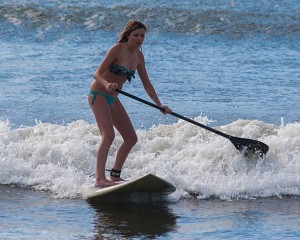Kauai, the fourth largest of the Hawaiian Islands, has over 100 times as many people as Ifaluk Island in Micronesia, it is 1000 times larger, and it is vastly more diverse and modern. Yet the two islands were carefully compared by an article last week in The Garden Island, a daily newspaper from Kauai.

The journalist for the newspaper, Brittany Lyte, interviewed an Ifaluk Islander named Donald Tarofmai, a young man of 20 who is now living on Kauai and getting an education. He has a job on Hanalei Bay, on the north side of the island, renting paddleboards and kayaks. The paper sought his opinions of the island where he was raised, and the vastly larger place where he now resides.
Mr. Tarofmai told the reporter that the small coral atoll where he comes from has no cars, only one store which just sells rice, and little need for money. People still get by on their subsistence economy and on their personal relationships. Most people on Ifaluk are related, he said. He thought that there are about 300 islanders there.
He traveled to Kauai for the first time when he was a small child to visit an uncle who had relocated to the community of Anahola, on the northeast coast of Kauai. He returned eight years later when he was 13 to visit his father, who was ill on Oahu. The father died of cancer so Tarofmai returned to Ifaluk.
He went back to Kauai in 2013 at the age of 18 to continue his education, and he has been living near his mother and uncle in Anahola since then. He is taking courses to be an electrician. When he finishes his training, he hopes to get a job so he can make good money to send back to his family on Ifaluk.
The journalist asked him some interesting questions, such as how he reacted as a 13 year old when he landed in Oahu. He responded that he was amazed by all the buildings, by driving in a car, and by the vast numbers of people. He told her that on Ifaluk, he knows everyone and everyone is related, so encountering huge numbers of people that he didn’t even know was really surprising to him.
He didn’t know English yet, so he was frightened by people trying to talk with him, and he was scared to use a telephone. He is learning English in school and he says he likes talking in English now because it helps him learn. But he talks only in his own language with his mother, who speaks no English.
The most exciting things on Kauai for him have been the cars. He’d seen cars on Yap, the largest island in his area of Micronesia, but he had never been able to drive one. He took lessons on Kauai and has enjoyed the experience. He finally got his own vehicle in July of 2015. He compares driving a car to being a captain on a boat, such as the one he paddled as a child. When he moved to Kauai, he put down his paddle and picked up a steering wheel, he says.
Asked about the different foods on the two islands, he said that he prefers to eat the rice and beef of Kauai over the breadfruit, taro, and fish diet of Ifaluk. But asked to compare the two islands in more detail, his responses show that he still values his place of birth. He says that since the Ifaluk don’t use money, they are used to helping one another as if they are family. “When you need help, you call the people to help you,” he adds.
Not everyone on Ifaluk has access to money—but then, one does not need money to eat, since the people can live off the land. They grow vegetables and they catch fish constantly. When someone needs a new house, everyone helps to build it, and is paid by the owner of the new house in foods which they share.
He says that the coconut is an essential tree on the island. It provides the wood from which they build their houses, the rope that they use, and the medicines they need.
Ms. Lyte then asks Mr. Tarofmai how he reacts to a culture based on money. He tells her that he misses the feeling on Ifaluk that if he is tired, he can just go to sleep. Not so on Kauai. On Ifaluk, he can borrow a canoe from his uncle if he wants to go fishing. On Kauai, he needs money to buy gasoline for the boat engine—presuming he has already bought a boat. That explains, he says, why everyone on Kauai works—because everything is expensive.
He concludes that he is proud of his native culture, but he plans to stay on Kauai for a while to finish his electrician training. He recognizes the problems that the rising sea level of the Pacific Ocean are posing for small, low-lying atolls like Ifaluk. High tides are rising. As a result, the Ifaluk will be needing more help from people who have access to money. He wants to stay on Kauai for the foreseeable future and help his people from there.